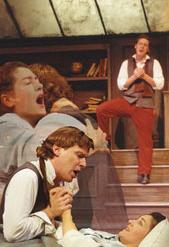SEARCH
REVIEWS
FEATURES
NEWS
Etcetera and
Short Term Listings
LISTINGS
Broadway
Off-Broadway
BOOKS and CDs
OTHER PLACES
Berkshires
London
LA/San Diego
Philadelphia
Elsewhere
QUOTES
On TKTS
LETTERS TO EDITOR
FILM
LINKS
MISCELLANEOUS
Free Updates
Masthead
Writing for us
A CurtainUp Review
La Bohème
by Elyse Sommer

Scene from dicapo Opera Company's La Bohème
|
The story of youthful joie de vivre coming up against life's hard knocks has not only stood the test of time but adaptation. Thus, the impoverished young artists' whose high spirits are dampened by tragedy has crossed my radar as a theater critic several times. Rent, the late Jonathan Larson's Pulitzer Prize/Tony Award-winning adaptation, which moved the Parisian setting to the East Village, is still going strong at the Nederlander. A few seasons back, impresario Baz Luhrman made quite a splash by daring to introduce Broadway audiences to opera with a La Bohème that had all the trappings of a Broadway musical but was nevetheless true to its operatic roots, notably having the libretto sung in Italian.
Luhrman's experiment was only moderately successful and its chief disappointment for opera aficionados was the fact that the voices -- all excellent -- had to be amplified to overcome the venue's acoustical shortcomings. Puccini, who is opera's answer to Rodgers & Hammerstein when it comes to composing a libretto that's hummable from start to finish, needs to be heard with God's own amplification to fully savor the rich and varied color of its gorgeous melodic arias.
The La Bohème that's opened 2005-06 dicapo opera season has all the pizzazz elements of Luhrman's Broadway Bohème -- young, talented, easy on the eyes singers and a handsome production with an amply populated Latin Quarter scene. And, thanks to this jewel box opera house's superb acoustics, it is totally "unplugged."
Because of the enormous vocal demands of the roles sung by the star-crossed lovers Mimi and Rodolfo, and the scrappy but kind-hearted Musetta and her lover Marcello, the six performances have been cast with three different singers for each of the leading roles. I hope you'll be as lucky as I was. Inna Dukach as Mimi and Todd Geer as Rodolfo sang magnificently and invested their parts with great warmth, as did Mark Womack and Manami Hattori as Marcello and Musetta. The supporting players were also quite fine. Maestro Francisco Bonnin and his 25-piece orchestra never overwhelmed the voices.
While the dicapo's elegant space is far smaller than the Met, every seat of the raked orchestra offers perfect sightlines and the low ceilings enhance the quality of the sound. Unlike many small companies which stint on the festive second act Latin Quarter and more somber Gates of the City third act, producer Michael Capasso, has gone all out with three well-detailed sets by John Farrell, beautifully lit by Susan Roth. Add to this the handsomely costumed 32-member singing ensemble of students, working girls citizens, shopkeeper, street vendors, soldiers, restaurant waiters and 23 extras to play children, mothers & fathers and you get the idea -- this is a big production in terms of staging as well as the voices but one which retains a sense of intimacy.
The transition from the bustling second act to the darker mood of the next one is smoothly achieved without an intermission. The elimination of one intermission and overtures before each act brings us to the well-deserved curtain calls in just under two and a half hours.
You don't have to be an opera buff to enjoy this all-time classical music crowd-pleaser. Nor is a ticket going to make an unreasonable dent in your pocketbook -- in fact, it's considerably less costly than either the Met or a Broadway show.
| La Bohème Giacomo Puccini Libretto in Italion by Giuseppe Giascosa & Luigi Illica, based on episodes from Henri Murger's scenes de la Vie de Boheme Conductor: Francisco Bonnin Production: Michael Capasso Cast: (In order of appearance) Mark Womack (Marcello), Todd Geer (Rodolfo), Michael Anthony McGee (Colline), Dominic Aquilino (Schaunard), Gary Giardina (Benoit), Inna Dukach (Mimi), Luke Grooms (Parpignol), Manami Hattori (Musetta), Gary Giardina (Alcindoro) Set Design: John Farrell Costume Design: Angela Huff Lighting Design: Susan Roth Running time: 2 hours and 20 minutes includes 2 intermissions. October 6, 7, 8, 9, 15, 16, 2005 Performances at 8:00 PM (4:00 PM on Sun. 9th & Sun.. 16th) Tickets: $47.50 Reviewed by Elyse Sommer based on 10/07 performance |

Easy-on-the budget super gift for yourself and your musical loving friends. Tons of gorgeous pictures.

>6, 500 Comparative Phrases including 800 Shakespearean Metaphors by our editor.
Click image to buy.
Go here for details and larger image.








